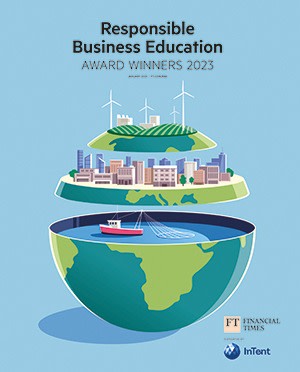Schools build consensus for focus on social purpose

Roula Khalaf, Editor of the FT, selects her favourite stories in this weekly newsletter.
In a virtual classroom hosted by Imperial College Business School in London, some 30 consultants from Bain gathered recently for a climate change boot camp. The programme is the latest example of companies seeking deeper insights on pressing societal issues. They are, in turn, triggering changes in the way business education programmes are administered.
David Brown, Imperial’s director of executive education, says he crafted the programme alongside Bain’s methodology, so that participants can apply what they learn immediately. They also take part in an “immersion day” with the school’s own climate tech start‑ups.
Imperial is one of 12 international business schools selected by Bain as partners for its new Further Academy, designed to provide 40 hours of postgraduate training on environmental, social and governance skills to all of its consultants and advisers around the world.
The trend is far from universal, but many other universities are transforming their offerings. David Marchick, dean of American University’s Kogod School of Business, for example, has recently revamped a specialist Masters in Sustainability Management.
Ann Harrison, the dean of Berkeley’s Haas School of Business, is using grant funding to “infuse sustainability” into its compulsory core curriculum. She is also developing a broader range of specialist elective courses and planning to launch a masters degree in climate solutions. “California is at the heart of climate change with fires, water shortages and the move to electric vehicles,” she says.

At Iéseg business school in France, Caroline Roussel, the dean, has forged a partnership with B Lab, a global non-profit group promoting sustainable business.
Designed to further the study and teaching of the B Corporation legal structure, the collaboration allows companies to balance profit objectives with broader societal goals.
“Students are getting louder on this topic, alumni working in companies are pushing us to do more and recruiters are seeking graduates with strong sustainability competence and passion,” says Roussel.
Andrew Hoffman, professor of sustainable enterprise at the University of Michigan’s Ross school of business has launched a series of programmes called “Management as a Calling” to help students who are interested in pursuing careers focused around meaning, purpose and service.
He resists claims that such efforts are “anti-capitalist”. Instead, he says, “this is about amending or fixing capitalism . . . students are jumping over themselves to get into these programmes”.
A range of other organisations are adding to the pressures for change. Student groups such as oikos International are actively lobbying business schools to inject more sustainability teaching into their courses, and the Positive Impact Rating provides a regular student-led assessment of progress.
Equis, the European based business school accreditation agency, places emphasis on societal impact for business. The Association to Advance Collegiate Schools of Business, its US counterpart, last year published the first outcomes of a new reporting framework against which institutions describe their activities, modelled on the UN’s Sustainable Development Goals (SDGs).
The UN’s own Global Compact Principles of Responsible Management Education network is developing a new framework to encourage business schools to report more systematically on initiatives aligned to the SDGs, including ways to measure academic research with societal impact.
The UN’s Higher Education Sustainability Initiative is also seeking to build a consensus around organisations that publish university rankings to better hold institutions to account for a broader range of societal impact measures.
In the UK, the British Academy’s Future of the Corporation review, which has called on companies to balance profit with purpose, planet and people, published a briefing late last year on purposeful business teaching to integrate these principles.
The country’s Research Excellence Framework has, for a number of years, required universities to report the impact of their work, with growing emphasis on their contribution to their local communities. Other countries including Canada are exploring similar accountability systems.
Business schools must balance such pressures with more traditional and sometimes contradictory demands from employers, many of whom remain unconvinced or have not yet developed new criteria for recruitment.
Another difficulty is defining what constitutes the benchmark of new knowledge and values required, and how best to teach and assess it. One response is Sulitest, a French-led “sustainability literacy” test being piloted in a number of business schools.
A final barrier is the management of schools. Professor Hoffman argues that there remains significant inertia among faculty, used to incentivising academics primarily based on their publications rather than on their teaching.
“The curriculum is in serious need of revamping. I’d blow up the core,” he says. “The effort to develop a new course is substantial. Teaching is what we do, but research is what we get rewarded for.”
If business schools do not adapt, they risk disruption. When Lombard Odier launched a partnership with Oxford university around sustainable finance, it was centred not on Saïd Business School but rather the Smith School of Enterprise and the Environment, for instance.
Tom Rippin, a former McKinsey consultant, launched On Purpose a decade ago to offer an alternative form of immersive training around sustainability and social purpose. He has since recruited more than 800 young professionals who are paid to learn over a year, primarily through two six-month placements in purpose-driven organisations in London, Paris and Berlin, supplemented by pro bono teaching by practitioners.
“Our approach and business model is disrupting the traditional MBA and Masters in Management models,” says Rippin. “We can’t afford to let the concept of purpose be watered down in the way that is happening in much of the current debate.”

Comments